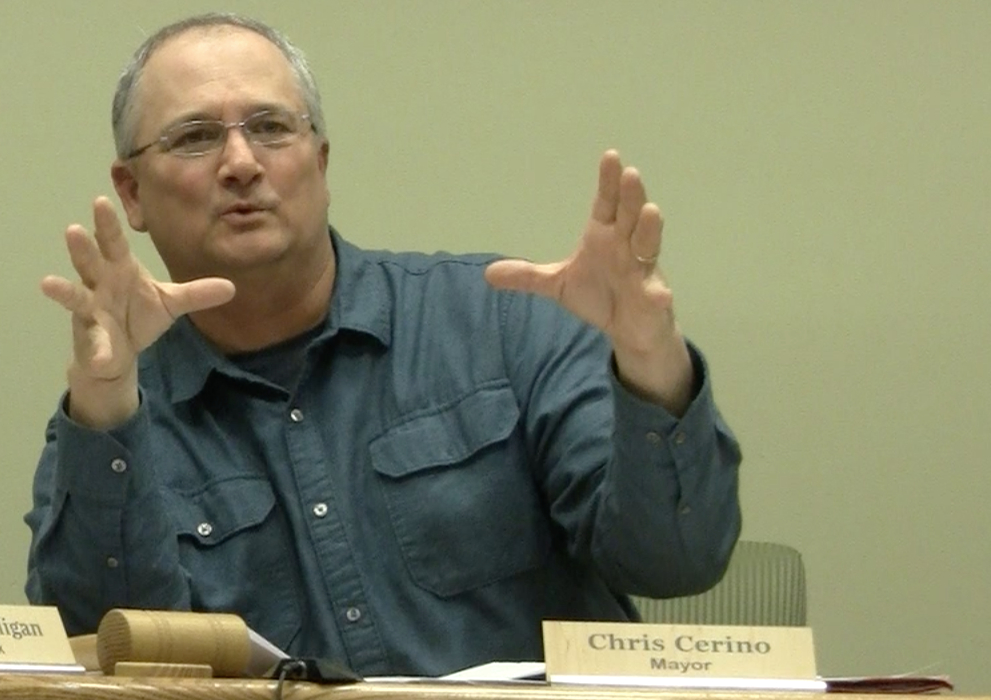The Chestertown Police Department’s future was secured Monday when the Town Council voted unanimously to keep it intact–and at the current level of 12 officers, which includes acting Chief John Dolgos.
This is down from a previous high of 14.
The decision ends a rollercoaster ride that began last fall when the Town Council considered options to cut the public safety budget, which included shuttering the department altogether–the “nuclear option.”
In his presentation before the vote Monday, Mayor Chris Cerino said the costs to run the department had climbed to $462,000 in the last decade, a 33 percent increase, while revenues had remained relatively flat.
“The model that we’ve been on for the last eleven years hasn’t been sustainable,” Cerino said. “We just can’t keep doing that.”
Other options considered last fall included making a payment every year to the Kent County Sheriff’s Office to staff police in Chestertown, which could potentially save the town upwards of $600,000. The savings would come from cuts in infrastructure costs to maintain a force.
“What that does is potentially gain efficiencies because we wouldn’t need our own police headquarters or any administrative staff, ” he said during Monday’s presentation. “[We would] essentially pay the county for officers that would be assigned full-time to Chestertown.”
The option that was adopted was to simply find efficiencies in the CPD’s budget and Cerino credited Dolgos for working with the town to find cost savings.
“Our acting chief has been very open to that,” He said. “He’s making a really good faith effort.”
“The public sentiment has been very overwhelming that we really like having our own police force,” Cerino said. “As long as people understand it’s one of our biggest line items.”
He said keeping CPD at 12 officers, including Dolgos, is a “cost savings.”
Cerino said while 14 officers were normally on the payroll, the department usually operated with 12 officers, due to staff on leave for various reasons.
“The nice thing about having our own police force is the control we have,” Cerino said. He said CPD is helpful with many town events.
“These guys know our streets and they know our town pretty well,” Cerino said.
Dolgos told the council during his police report that officers on his staff were looking elsewhere for employment because of uncertainty facing the department’s future.
Currently, there are three officers looking to leave, Dolgos said.
Cerino recognized that the uncertainty was harmful to the work culture at CPD.
“The uncertainty is not helping us with retention or morale or anything that makes a workplace a positive place to be,” he said.
Cerino recommended giving Dolgos the authority to keep the number of officers at 12.
“Right now [Dolgos] is in limbo where we’ve kind of undercut cut his ability to do his job well,” Cerino said. “I feel bad about that and I want to try and rectify it.”
Ward 3 Councilman Ellsworth Tolliver said it was important for Chestertown to have its own police force and was hopeful that CPD could return to a staff of 14 when revenues make it affordable. He said he appreciates the quick response he gets from Dolgos when issues arise in his ward.
Ward 1 Councilman David Foster said he applauded Dolgos for “making a good faith effort” to cut costs. Foster added that there is a need for “new ideas” to find efficiencies at CPD.
“At the same time, and this is not disrespectful to our current police force, I think it is important from time-to-time to ask if we have a source of new ideas coming in here,’” he said. “I have no expertise in public safety but I do know that there are people out there who do have that.”
Ward 2 Councilman Tom Herz also praised Dolgos but agreed with the Foster that as a “matter of form” a search should be on for a permanent police chief. Dolgos was made acting police chief after former Chief Adrian Baker left on short notice to lead the Maryland Natural Resources Police in September.
Ward 4 Councilwoman Meghan Efland expressed concern about the overtime costs and if staffing 12 officers would give Dolgos the resources needed to run the department.
She recommended an efficiency study to find savings and improve scheduling to reduce overtime.
“I think that’s our best option at this point,” she said.



Bill Anderson says
Concerning efficiencies and all other matters pertaining to the police dept., and for that matter across all town departments, it is those closest to the work who may produce the best and most workable answers/suggestions. The Mayor and Council need to put that out to town employees and perhaps offer some sort of recognition to those whose ideas or proposals are implemented. Assure them that anonymous responses will also be considered. The recognition need not be excessive – maybe even a non-cost reward like a couple of extra paid days off.